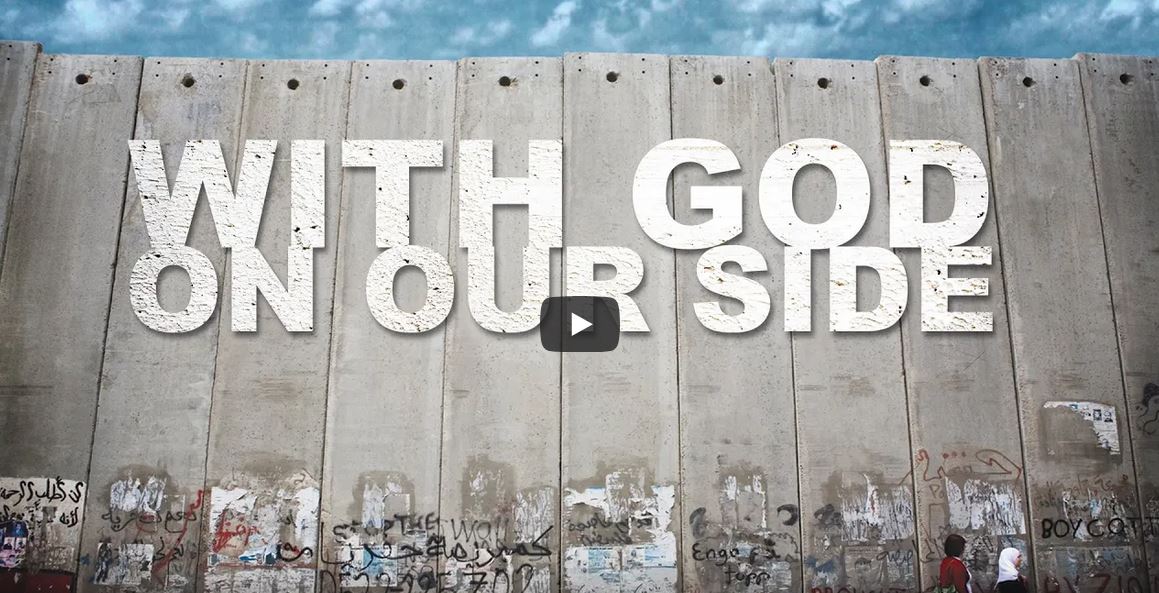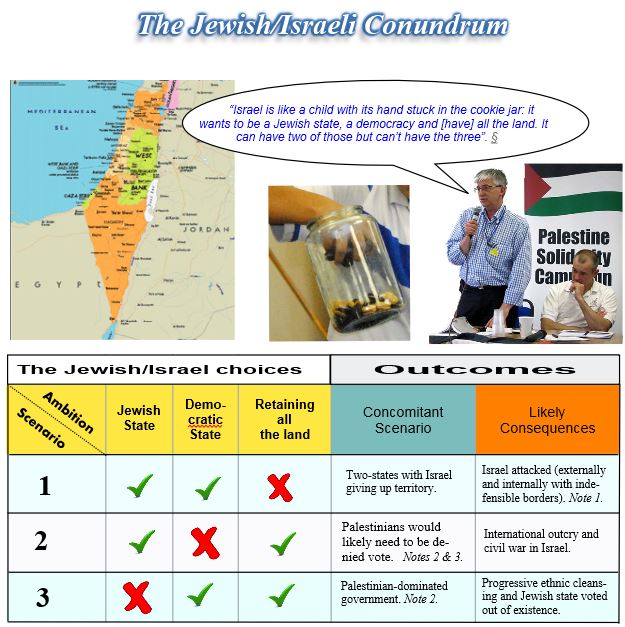Israel's Conundrum
At a seminar in Dundee in 2010 one of the speakers outlined his view of the trilemma facing Israel.

Rev. Dr. Stephen Sizer went on a tour with the producer of the film 'With God On Our Side'. One of the venues was in Dundee. An evening event included all comers: the next day a meeting was held for Christians in a Dundee church.
 The following is a 'Sizer' sizer quote was given following the presentation in the church. (See here for short video.) The following is a 'Sizer' sizer quote was given following the presentation in the church. (See here for short video.)
A written report of the church meeting can be found here.
“Israel is like a child with its hand stuck in the cookie jar: it wants to be a Jewish state, a democracy and [have] all the land. It can have two of those but can’t have the three”.
(Rev. Stephen Sizer)

(For larger print of the table click on image above for PDF file)
Note 1. In spite of Hamas’ recent change to its public position regarding accepting the concept of a Jewish state it is likely that the Islamic principle of ‘Hudna’ will prevail whereby peace is only agreed while in a weaker position, with any truce being rescinded when in a position of strength. Additionally, any decrease in Israel’s land area would substantially reduce what buffer zones Israel currently holds. The scenario would be ripe for external attacks with a ‘Fifth column’ attacking from within the Palestinian state.
Note 2. “By 2035, Jewish population in Israel/Palestine has been projected at 46%. However it is possible that this figure takes no account of future Aliyah (by Jews) or the ‘right of return’ claimed by Palestinians. (See Tzipi Livni comment.)
Note 3. With the passing of the new Jewish Nation-State law (19 July 2018) it would appear that the choice being exercised by the present Israeli government is to move towards scenario ‘2’.
§ "Israel is like a child with his hand stuck in the cookie jar....". Rev. Dr. Stephen Sizer (Dundee, Nov. 2010: www.vimeo.com/17157474 - 2mins 43secs on timeline)
---------------
In Aesop’s Fable ‘The too fat Fox and the Tortoise’ a starving fox finds some food inside a hollow tree. In gorging on the food the fox then finds he is trapped; too fat to get out of the hole in the tree. The only way of escape is by losing weight through starving himself again. |
-----------------------
On July 19, 2018 The Israeli Government voted to introduce a new Nation/State Law.
The following lists some of the related reports and reactions:
The Jerusalem Post
Basic Law: Israel - The nation state of the Jewish people Read the full nation state law.
1. The State of Israel
a) Israel is the historic homeland of the Jewish people in which the State of Israel was established.
b) The state of Israel is the nation-state of the Jewish people, in which it fulfills its natural, religious, and historic right to self-determination.
c) The fulfillment of the right of national self-determination in the State of Israel is unique to the Jewish people.
2. National symbols of the State of Israel
a) The name of the state is Israel.
b) The flag of the state is white, two blue stripes near the edges, and a blue Star of David in the center.
c) The symbol of the state is the Menorah with seven branches, olive leaves on each side, and the word Israel at the bottom.
d) The national anthem of the state is "Hatikvah"
e) [Further] details concerning the issue of state symbols will be determined by law.
3. [The] unified and complete [city of] Jerusalem is the capital of Israel.
4. The Language of the State of Israel
a) Hebrew is the language of the state.
b) The Arabic language has a special status in the state; the regulation of the Arab language in state institutions or when facing them will be regulated by law.
c) This clause does not change the status given to the Arabic language before the basic law was created.
5. The state will be open to Jewish immigration and to the gathering of the exiled.
6. The Diaspora
a) The state will labor to ensure the safety of sons of the Jewish people and its citizens who are in trouble and captivity due to their Jewishness or their citizenship.
b) The state will act to preserve the cultural, historical and religious legacy of the Jewish people among the Jewish diaspora.
7. The state views Jewish settlement as a national value and will labor to encourage and promote its establishment and development.8. The Hebrew calendar is the official calendar of the state and alongside it the secular calendar will serve as an official calendar. The usage of the Hebrew calendar and of the secular calendar will be determined by law.
-----------------------
The Guardian
The European Union has led a chorus of criticism after Israel passed a controversial law declaring that only Jews have the right of self-determination in the country.
Adding that the legislation would complicate a two-state solution to the Israel-Palestinian conflict, the EU joined Israeli Arab political leaders, Israeli opposition politicians and liberal Jewish groups in the US in flagging up concern, with some saying the law amounted to “apartheid”.
The legislation stipulates that “Israel is the historic homeland of the Jewish people and they have an exclusive right to national self-determination in it”.
It also strips Arabic of its designation as an official language alongside Hebrew, downgrading it to a “special status” that enables its continued use within Israeli institutions.
Read full article here.
-----------------------
05/01/19 (extracts)
What about the peace process?
>>>extract>>>
Tzipi Livni, co-leader of Israel’s centre-left opposition, the Zionist Union and ex-foreign minister was chief peace negotiator with the Palestinians. She wrote recently: “As a true supporter of peace based on the principle of two-states-for-two-peoples, the demand that Palestinian refugees “return” to Israel is not only at odds with the very rationale of a two-nation-states solution, but if accepted, would lead to a continuation of the conflict long after the establishment of a Palestinian state. Such a scenario should be rejected by anyone who truly seeks peace in our lifetime.”
She added: “Unfortunately, Palestinian refugees have been used as a political playing card for far too long since 1948. Palestinians are the only group since the end of the second world war to have kept their refugee status and to have passed this status down to over four generations, creating a problem of millions of “refugees” that are kept as pawns in a political game instead of solving their humanitarian situation.”
<<<< ends <<<<<
Israel accused of passing an Apartheid law
In July 2018 Israel passed the very controversial Nation-State law, which led to demonstrations and strong criticisms in Israel itself. The law affirms that:
-
“Israel is the historic homeland of the Jewish people who have the unique right of self-determination.”
-
“Jerusalem is the united capital of Israel”
-
“The official language is Hebrew. Arabic has special status.”
-
“The state places national value on the development of Jewish settlement and will act to encourage and promote its establishment and consolidation.”
The main criticism is that the country has 1.8 million Arab citizens (“Israeli Arabs” as opposed to Palestinians who are not Israeli citizens) and this law renders them officially second-class citizens. Obviously this applies to other non-Jewish citizens too. Many Israelis see this as undermining democracy, saying that Israel is the nation state of the Jewish people and a democracy.
Tzipi Livni said that some of Netanyahu's ministers thought the law was “a mistake,” and added “It's not too late to apologize (again), to amend and introduce equality. Israel is the nation-state of the Jewish people, on that we all agree - for equal rights for all we still need to fight.”
The law was passed by 62 votes to 55 after a heated eight-hour debate during which opposition and Arab MPs tore up the printed text of the law, waved black flags and shouted “apartheid.” Mordechai Kremnitzer, Professor of Law at the Hebrew University of Jerusalem, said the bill would “remove the mask so as to reveal the ugly face of ultra-nationalist Israel in all its repugnance.”
Rabbi Steven Wernick, of the United Synagogue of Conservative Judaism, said “Israel is losing its soul and weakening its democracy and Jewish character. Its beacon of light on the nations is now dim. Even I am having difficulty seeing it.” One Israeli newspaper said Netanyahu regarded Israeli Arabs as a “nuisance” and “has visited Arab communities only rarely, and has never shown any interest in the culture or distress in Arab society here.”
|